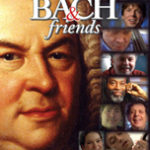
Michael Lawrence Films
The music of Johann Sebastian Bach would normally not be associated with the electric strands of improvisational music, or jambands, in general. However, that would be a hasty and inaccurate conclusion based on predetermined categorizations. Bach was a prolific composer who wrote classical music, and is considered an almost superhuman influence on numerous forms of structured art. The man was also quite adept at pulling sheets of sounds from some far off place in the cosmos, when great musicians shut off their brains, and just play for the ages.
In Michael Lawrence’s captivating film, the director records numerous musicians at their homes, in the studio, or on stage, speaking about the music of Bach, his influence on their own work, and a performance, or two, from each musician. Lawrence selects from a wide variety of musicians, from various backgrounds, and musical interests, and that is where the film really takes off, and carries its unique power. Musicians featured include Béla Fleck who discourses on Bach’s easy translation to the banjo, Bobby McFerrin and his vocal theatrics and conductor exploits within the music of Bach, Jake Shimabukuro and the difficulty of mastering Bach on the ukulele, Philip Glass and the intellectual side of the composer’s art, Chris Thile and the glory of Bach’s impact on his mandolin playing. The list is long and colorful, and also ranges to a young girl who plays at senior citizen homes, to the magical work of hallowed conductors such as João Carlos Martins.
But where the film has an especially strong gravitas is when there is a discussion of the importance of improvisation in Bach’s music. There are examples of where Bach lets his imagination run free, and they are discussed with clarity, wit, and wonder. The wonderful pianist John Bayless, who is a powerful advocate for the art of Bach improv, gets a brain x-ray scan while improvising on a Bach tune, his head in the machine, and his hands free to play a keyboard while laying flat on his back with only a mirror to show him his fingers dancing across the rectangular instrument, riffing on a holier-than-thou piece of sublime tapestry. What is found is the brain does indeed shut down some of its functions, and sends a poignant message to the body: “just let go and play,” while improvising. It is a predictable message, but a profound one, nonetheless, to see verified in this form, showing that Bach wasn’t the only one just switching off the noodle, and going for it.
Of course, Bach composed an insane amount of music that was carefully crafted due to his prodigious genius, and indefinable, almost post-medieval work habits—that ancient creed, formalized in the post-Renaissance era where the reward for one’s work is, in fact, in the work itself. Which is great because if Bach truly felt that—his work was THE end all be all of his existence—we were all rewarded with his timeless music, as the man was never as recognized during his lifetime as much as he would be later on. Centuries on, his art resonates with profound clarity, and Michael Lawrence, with his team of talented musicians on camera, offers an excellent and passionate portrait of the master’s work.



No Comments comments associated with this post